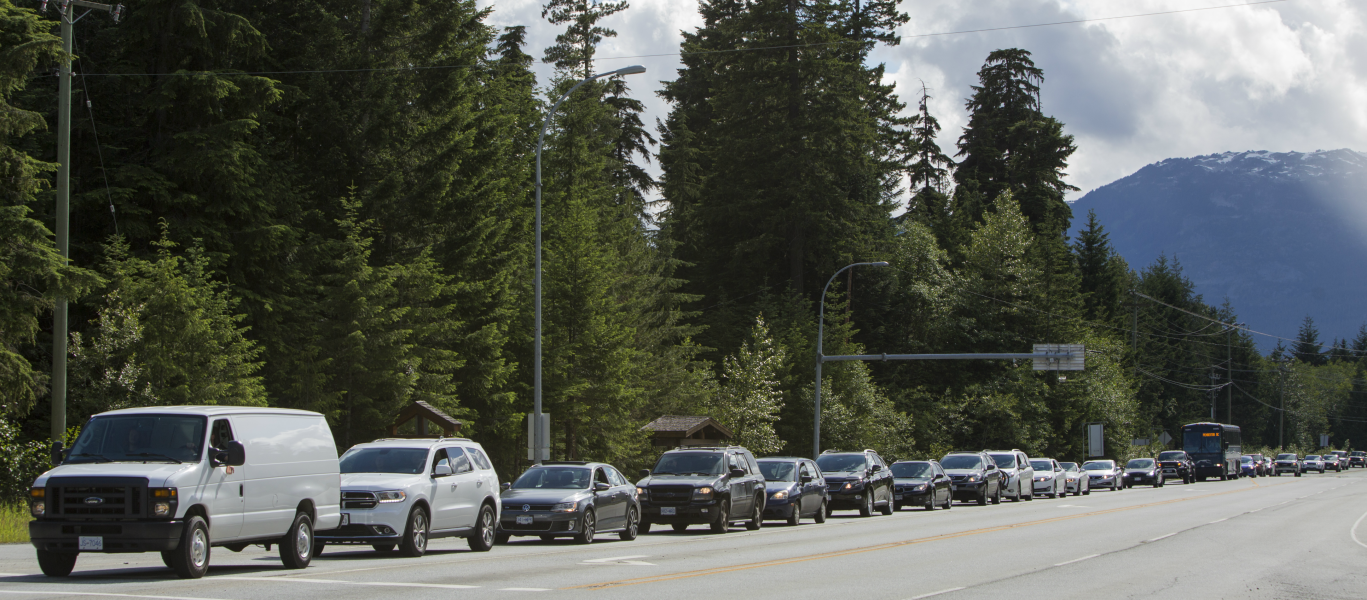
The Transportation Advisory Group (TAG) has been asked to look at transportation and parking pressure in and around Whistler. TAG is composed of a group of diverse stakeholders representing the RMOW, Whistler Blackcomb, Tourism Whistler, the Whistler Chamber of Commerce, BC Transit, the Ministry of Transportation and Infrastructure and four citizens-at-large.
TAG is in the process of finalizing its long-term action plan based on months of research on the use of Whistler’s highways, roads, parking and transit. The short-term plans were adopted by Council on June 6, 2017.
Research undertaken to inform the short-term action plan includes:
- Sea to Sky Highway 99 traffic analysis model
- 2016 Parking Study-Presentation to Council December 20, 2016
- 2016 Parking Study-Report
- Summer Saturday free transit “Know Then Go” pilot project
- Sea to Sky Highway Road Closures Assessment
Key research highlights
TAG’s research highlights that were presented at the Transportation Community Forum in January, 2017 include:
- Traffic levels in Whistler were significantly higher in 2016 compared to historic levels. While trips coming in from outside of Whistler both north and south have grown, a large portion of daily traffic measured by the Highway 99 traffic counters was generated by trips within Whistler. This presents an opportunity to reduce congestion by shifting behaviour so people take fewer vehicle trips when in Whistler.
- Parking should be managed to ensure a better customer experience, with the goal of 10 to 15 per cent availability during a regular busy day. Read the full report.
- Transit ridership in Whistler is high compared to other communities in British Columbia however, there is still room to grow ridership. Additional hours will be added to the system in April 2017, as well as additional buses to the fleet in 2018. The 2016 free summer Saturday pilot project, which provided more free transit until 8 p.m., resulted in a 52 per cent increase in ridership, with many people citing the hassle of finding parking as a major reason for choosing to take transit on those six Saturdays.
- The RMOW has partnered with the Ministry of Transportation and Infrastructure to develop a traffic simulation computer model to help gauge how future scenarios will impact transportation on Highway 99 from Horseshoe Bay through to Pemberton. A detailed report will be provided to TAG in 2017.
The short-term plan
Increasing the efficiency of Highway 99
- This includes understaking an intersection study into ways to increase traffic movement.
- Improving accident investigation times by implementing the recommendations from an accident investigation study.
- A pilot project synchronizing traffic signals along Highway 99 in summer and keeping the green light green for longer in the direction of busiest traffic flow.
- Continuing the emergency highway closure and congestion protocols.
- Supporting the Ministry of Transportation and Infrastructure assessment of ways to add capacity to Highway 99 through Whistler.
Transit improvements
- This includes expanding Whistler’s BC Transit service to have more frequent service on priority routes from 7 a.m. to 10 p.m. Buses would have a goal frequency of every 15 minutes in winter and every 30 minutes in summer.
- Expanding the Family Travel program to allow a fare-paying adult to bring up to three children aged 12 or younger for free between the months of May and October.
- Implementing a pay parking fund to support the reduction of local transit fares.
- Meeting with Vail Resorts, Inc. to begin discussions about transit passes being combined with Whistler Blackcomb lift tickets, and Whistler Blackcomb ticket sale revenue being invested in transit. Meeting with Whistler event producers to discuss transit contributions from event revenue.
- Implementing a BC Transit bus “queue jumper” summer pilot project on Highway 99, that reduces bus delays when Highway 99 is busy.
- Making the bus schedule easier to read.
- Providing free transit for 10 entire Saturdays and Sundays as a pilot project in summer 2017.
Managing traffic on busy days with the Peak Day Operations Plan
- This includes placing personnel at key traffic signals and day parking lots to manually control traffic during extremely busy periods.
- Working with private parking lot owners to better direct users to underused parking spots.
- Developing and implementing a secure bicycle parking system that includes secure overnight parking for events as well as Saturdays and Sundays from July 1 to September 4.
- Directing traffic to underused parking lots during peak days, such as the Creekside parkade, private lots in Whistler Village and the Upper Village, as well as Day Lots 6, 7 and 8 in the summer.
- Providing free transit for 10 entire Saturdays and Sundays, and 3 holiday Mondays, as a pilot project in summer 2017.
Better parking management
- This includes beginning to implement the recommendations of the 2016 Whistler Parking Study to reduce time limits in parking lots, increasing short-term parking availability in Whistler Village, and increasing the daily and monthly rates.
- Starting plans for automated highway signs on Highway 99 or phone parking apps that indicate which parking lots are full.
- Investigating potential car counters and full signs for the Conference Centre underground parking.
- Encouraging private parking lots to better attract visitors using temporary signs and personnel, as well as encouraging the operators to participate in communications about available parking spots.
- Developing and launching a parking app for publically available Whistler parking spots.
Making sustainable transportation options more attractive
- This includes developing and implementing a secure bicycle parking system that includes secure overnight parking for events as well as Saturdays and Sundays from July 1 to September 4.
- Working with car share companies to expand car-share options in Whistler.
- Developing a free or reduced rate and transferable parking pass for carpools.
- Meeting with bus service providers who travel between Vancouver, Vancouver Airport and Whistler to identify and address challenges for bus users.
- Improving safety on the Valley Trail by posting speed limits on key areas.
